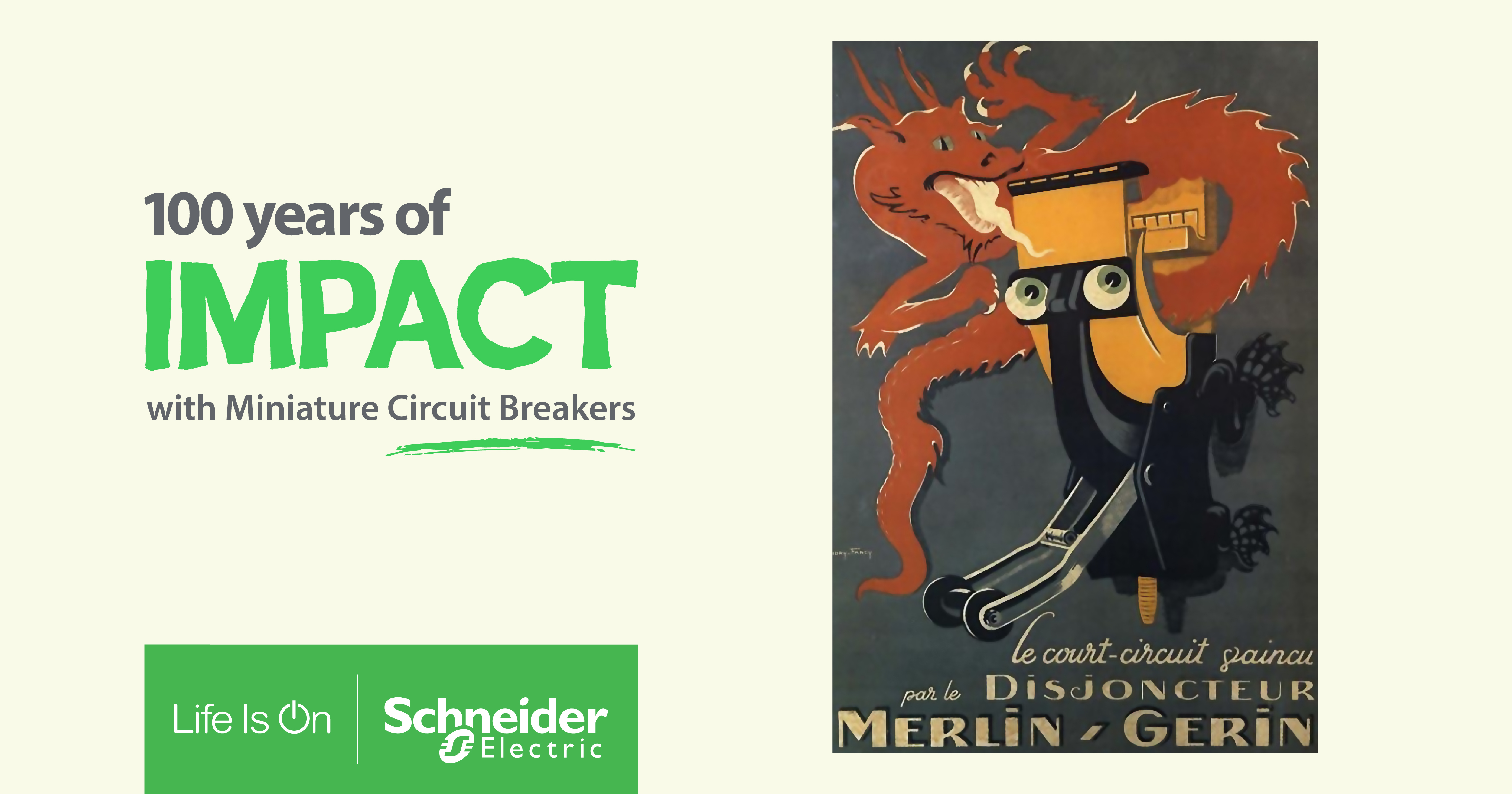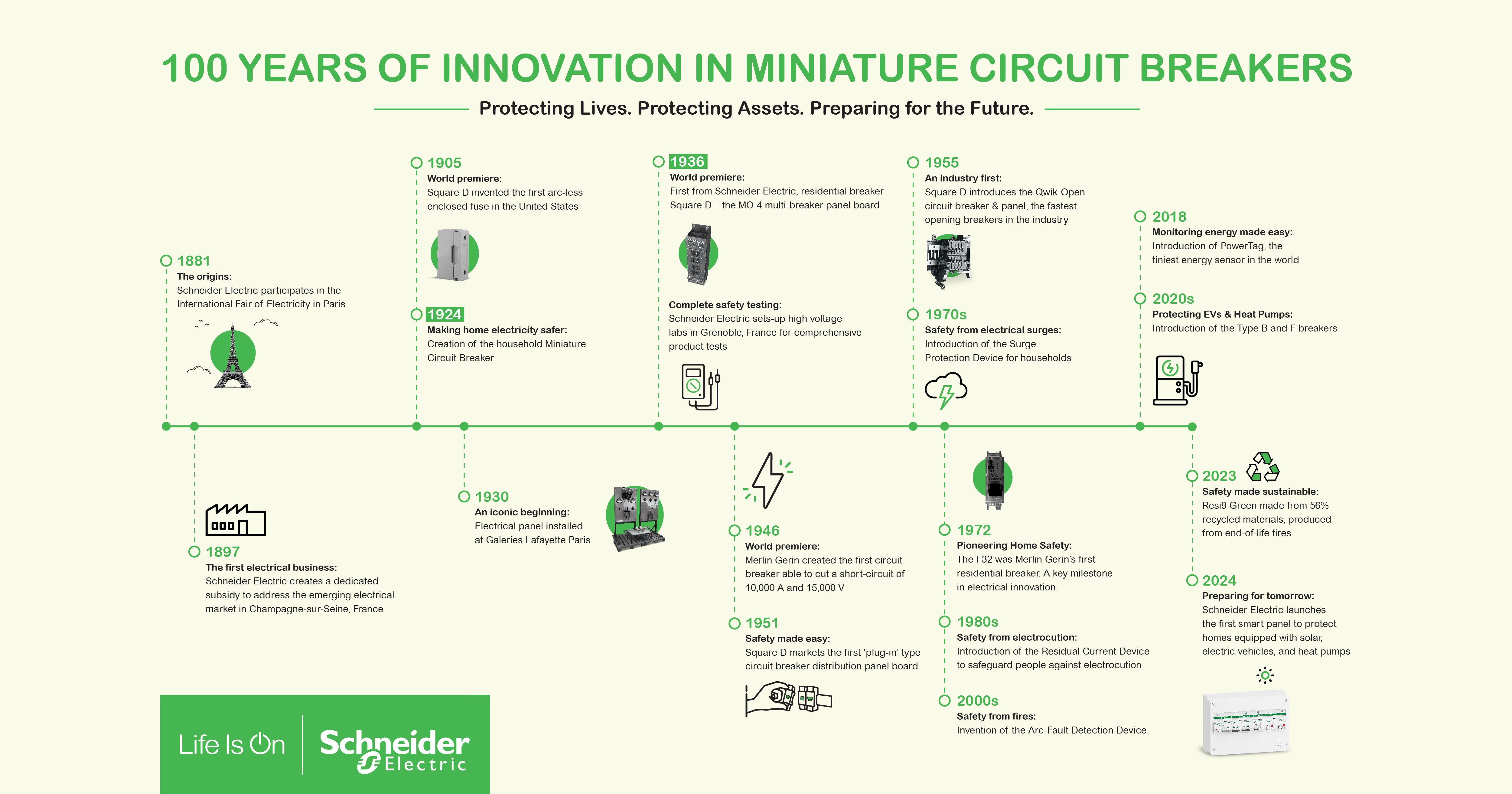Home circuit breakers: 100 years of keeping us safe

You walk into a room and turn on the light. Do you ever stop to think about what it takes to power the lightbulb as you flip that switch? Or how our outlets are always ready to charge our smartphones? No — we just expect these things to happen, and happen safely, without a second thought. A century ago, after years of innovation and technological improvements, the miniature circuit breaker was introduced to safely bring electrical power into homes for the first time. This year, Schneider Electric, celebrates 100 years of these unsung heroes of home energy safety. Here’s why you should too.
Miniature circuit breakers reside right in the heart of the home, in the electrical panel where power is received and supplied across the home to the various outlets, switches, and devices that we rely on every day. From our alarm clocks to our electric vehicles, to the very smartphone in our pocket that connects us to the world. However, a study by Schneider Electric of 9,000 consumers in seven countries revealed that 41% of Gen Z are unaware of what this crucial piece of technology in their homes is even for. Furthermore, 25% of the Gen Z population surveyed don’t even know where the electrical panel is in their home.
How did these circuit breakers end up in the electrical panel, and how did they come to resemble the boxes we all rely on in our homes today?
A history of progress in electrical safety
Electrical innovation began in the early 19th century. After its founding in 1836, Schneider Electric spent 150 years pioneering advancements in electrical safety. Entering the homes over the past century, the circuit breaker has enabled us all to live safely and happily without even realizing its protection. It safely cut the power when water spilled on the multi-socket extension cord and stopped it from overheating when too many loads were plugged into the same socket.
And as technology evolved, so did the protection they provided. The introduction of surge protection and residual current devices in the '70s and '80s made your TV safe while you watched during a big storm — people before that time could not watch TV during a storm! The electrical protection evolution continued by making your relaxing bath safe while your partner used their hair dryer, and crucially protected curious toddlers playing with sockets from fatal electrocution. As we go into the 2000s, arch-fault detection was introduced to provide additional fire protection by cutting power when it recognizes power flow through the air between two conductors.
Over the years, engineers at Schneider Electric have worked to enhance home electrical safety, so you don’t have to think about it. Perhaps the people who don’t know the role of their electrical panel are the best testament to these engineers’ efforts!
Celebrating the past while innovating for the future
The lack of awareness around electrical protection has been the norm for decades, but home power needs are changing. This new era, sometimes referred to as Electricity 4.0 represents a more sustainable, smarter way to approach energy distribution designed for advanced technological and critical challenges, including power resiliency and the climate crisis. Understanding how our home electrical distribution system functions is a critical first step in moving toward a greener, more sustainable power grid.
Homes are evolving with greater electrification in response to this new energy landscape. Solar panels, EV chargers, and heat pumps are now becoming more common in homes, meaning the role of that electrical panel has never been more important. However, there is a critical point that less than half of the consumers surveyed realize: the more you electrify your home with solar, EVs, and heat pumps, the greater the strain on your electrical panel, increasing the risk of it overloading. Potentially putting your family, home, and belongings in danger.
This sea change comes as more of Gen Y and Gen Z are becoming homeowners. This forecasts a huge demand for new energy technology and therefore a widespread need for advanced electrical panels to keep those homes safe. Most homes in the United States were built before the 1980s, and only a small percentage of those homes have been upgraded to meet today’s safety standards. Improving electrification can help decarbonize your home, but the strain can be dangerous with outdated panels.
“The electrification of our homes is undeniably a positive step towards a more sustainable energy future. This shift, powered by renewables, enables us to tackle the 20% of global emissions produced by homes. However, as exciting as the transition to a new energy landscape is, it’s vital that safety sits at its core,” says Michael Lotfy Gierges, Executive Vice President of Global Home & Distribution Division at Schneider Electric.
Modern problems require modern solutions
Upgrading your home’s electrical panel can seem daunting, but it will become necessary as you increasingly electrify your home. To keep your home safe Schneider Electric has electrical panel solutions that can bring your home up to modern standards with high functionality hardware and state-of-the-art software. For the European market, the Resi9 Energy Center offers enhanced security, safety, and sustainability for those who are looking to move from being a consumer to prosumer —someone who both use and produce electricity in their homes— with solar panels for example, or someone who may be adding larger loads, such as an EV charger, in their homes.
For those in the US looking to modernize their homes, Schneider Electric will soon launch its first-of-a-kind Schneider Pulse smart panel. The Schneider Pulse panel safely integrates directly with solar, battery, and inverters from a range of manufacturers including Schneider Home ecosystem to be launched shortly.
These advances in home electrical distribution represent another successful step in electrical engineering to ensure that homes meet the electrical needs of today without sacrificing what really matters—your safety.
“Utilizing our 188 years of experience – 150 of which have been dedicated to the electrical market –our innovative home smart panel solutions offer a true evolution of the electrical panel. We are proud to introduce solutions that support the electrification of today’s homes while keeping safety, resilience, efficiency, and sustainability at the forefront,” says Gierges.
Schneider’s purpose is to empower people to be more sustainable, turning ambitions into action. Whether you’re adding solar panels and electric vehicle charging stations to your home or making the switch to more sustainable heat pumps and induction cook tops, Schneider Electric’s ecosystem of global offers have been developed to advance smarter and safer home electrical distribution for everyone.
Sign up for breaking news, reviews, opinion, top tech deals, and more.
